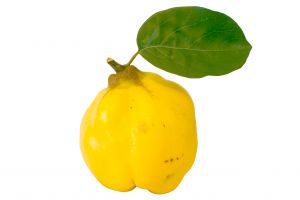
QUINCE TREE.Cydonia Vulgaris.—It is now cultivated in gardens, especially in the south of England. It yields a fruit which is used for imparting a pleasant flavour to tarts and pies. Quinces arealso made into marmalade; and the syrup made from them isa pleasant addition to beverages during sickness. The juice ofthe ripe Quince made into a syrup with sugar is excellent tostop vomiting, and to strengthen the stomach.
The green fruitis astringent, and restrains flux, and diarrhoea. The syrupmade of the juice is still more so. The mucilage is used externally as an emollient and sheathing application to crackedlips and nipples. Bandoline, used by hairdressers as a cementfor dressing the hair in braids, is merely this mucilage evaporated. It appears to have narcotic properties, for a strongdecoction sweetened with honey, destroys flies. If a littlevinegar be added, Quince promotes appetite. Some spices beingadded, it revives fainting spirits, and removes obstructions fromthe liver. If you would have them purging, put honey to theminstead of sugar; and if more laxative, rhubarb; but if moreforcibly to bind, use the unripe Quinces. The crude juice ofQuinces, is a sure preservative against deadly poison. Somesay that the very smell of a Quince bath taken away all thestrength of the poison of white hellebore. The seeds whenboiled in water make a good mucilaginous decoction which isuseful in thrush, and other irritable conditions of the mucous membrane :—Quince seed 2 drachms in 2 pints of water, boil 10 or 15 minutes, and strain. Sweeten with sugar or honey.
Important Disclaimer:
The information contained on this web site is for educational purposes
only. It is not intended to diagnose, treat, or cure any diseases. Any
information presented is not a substitute for professional medical advice
and should not take the place of any prescribed medication. Please do not
use this information to diagnose or treat a health problem or disease
without consultation with your physician.
This page and the rest of the encyclopedia of medicinal herbs was reproduced from old herbals written in the 1700 and 1800s. They are of historical interest to show the traditional uses of various herbs based on folk medicine and ancient wisdom. However the traditional uses for these herbs have not been confirmed by medical science and in some cases may actually be dangerous. Do not use the these herbs for any use, medicinal or otherwise, without first consulting a qualified doctor. Browse Herbs Alphabetically: A B C D E F G H I J K L M N O P Q R S T U V W X Y Z |
Advertisement
|
||
|
|||
